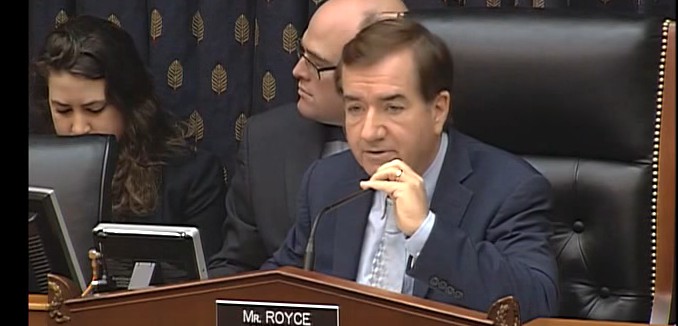A bipartisan resolution stating that peace between Israelis and Palestinians “will come only through direct bilateral negotiations between the parties” passed the House of Representatives unanimously on Tuesday.
The resolution urged President Barack Obama to veto any United Nations Security Council resolutions that would set parameters for a peace deal between the two parties. Such a resolution would be “unacceptable to any Israeli government, left or right – making it impossible to see any future peace,” Rep. Ed Royce (R-Calif.), the chairman of the House Foreign Affairs Committee and sponsor of the resolution, said on the floor of the House.
Royce also questioned whether the Palestinian Authority was properly preparing its population to make peace with Israel, noting that the PA has incited its citizens to violence against Israelis and also “[rewards] Palestinian terrorists in Israeli jails with a monthly paycheck.” He called on the United States to “stand firm,” and recognize that “the Israeli-Palestinian conflict can only be resolved through direct negotiations between the parties.”
House minority whip Steny Hoyer (D-Md.) issued a statement praising Royce and Rep. Eliot Engel (D – N.Y.), the Foreign Affairs Committee’s ranking Democrat, for working together to pass the resolution.
I strongly support today’s bipartisan resolution reaffirming that the only way to end the Israeli-Palestinian conflict is through direct, bilateral negotiations between the parties. Attempts to impose a solution through international fora like the United Nations only erode trust and fail to recognize the complexities of issues that need to be worked out by Israelis and Palestinians together. There are no shortcuts to achieving the goal of Middle East peace. The United States will continue to oppose efforts like the boycott-divestment-sanctions (BDS) movement that seek to place the full burden of taking steps for peace on Israel when it has been Palestinian leaders who have continued to sow violence and mistrust and cultivate alliances with extremist groups bent on killing innocent Israelis.
Hoyer emphasized that he was “proud to be part of a broad, bipartisan coalition in Congress that stands up for our ally Israel and works to ensure that Israelis have the support they need to pursue a secure peace that will bring safety and opportunity to all people in the region.”
The bipartisan efforts to pass the resolution were also praised by House Speaker Paul Ryan (R – Wisc.):
Republicans and Democrats agree that a lasting peace between Israelis and Palestinians can only be achieved through direct negotiations. Today, the House urged the Obama administration to forcefully oppose any unilateral moves by the UN to impose a solution to the conflict. These efforts, which almost always place disproportionate pressure on Israel, only push the parties further apart and undermine the cause of peace.
Rep. Brad Sherman (D – Calif.), the second-ranking Democrat on the House Foreign Affairs Committee, reiterated the idea that there are no shortcuts to achieve peace. “As president Barack Obama said in 2011: ‘Peace is hard work. Peace will not come through statements and resolutions at the United Nations. If it were that easy, it would have been accomplished already,'” Sherman told the Washington Examiner. “We must heed this advice. Imposing a solution on the parties will not work. In fact, it will be counterproductive to peace. It would undermine incentives for the Palestinian authority to make the necessary changes that are prerequisites to peace.”
The sentiments expressed by these congressional leaders echo those of former State Department peace negotiator Aaron David Miller, who warned in an analysis on Wednesday for CNN.com that an American unilateral moves to impose peace terms on the parties would “leave the Obama legacy in tatters, while diminishing US credibility in the process.”
Miller’s analysis was prompted by a New York Times op-ed by former President Jimmy Carter that urged Obama to break with American diplomatic practice and endorse unilateral UN efforts in support of Palestinian statehood.
[Photo: HFACDemocrats / YouTube ]




